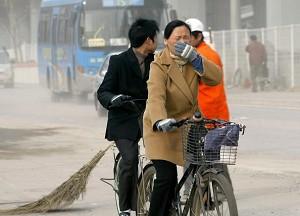While the World Bank Report on pollution in China is yet to be finalized, the Financial Times reported that the Chinese regime had censored the draft. The omitted text of 750,000 premature deaths due to pollution “was too sensitive and could cause social unrest.” Whereas the Chinese environmentalists believe the mortality and morbidity could be higher based on the broad definition of pollution.
The draft “Cost of Pollution in China: Economic Estimates of Physical Damages” produced in cooperation between the Chinese ministries and World Bank was made available on the World Bank website in March. According to the Financial Times, the report “cut the calculations of premature deaths … according to bank advisers and Chinese officials.” That included “750,000 people die prematurely in China each year, mainly from air pollution in large cities.”
Chinese environmentalist Zhu Jiajin said: “I believe it and I am not too surprised. People are ignorant simply because no one has really paid attention to it for the sake of development.” Last month Zhu and other environmentalists had organized an activity “to defend the homeland” and “Xiamen against PX-Benzene.” It was one of the very rare successful environmental protest cases. She said that “Xiamen’s air pollution is minor, considering other major cities suffer from sandstorm as well.
According to the Financial Times, “missing from this report are the research project’s findings that high air pollution levels in Chinese cities are leading to the premature deaths of 350,000-400,000 people each year. A further 300,000 people die prematurely each year from exposure to poor air indoors” and “the mortality information was reluctantly excised by the World Bank from the published report.” Analysis indicates that even though the Chinese regime proposed the Green Gross Domestic Product (Green GDP), the pollution issue in the report has caused concern to the Olympics participants. The Australian International Olympic Committee President has advised participants to avoid early arrival in Beijing, so as to reduce the exposure to pollution.
Xia Yeliang of Peking University School of Economics said, “Pollution does not necessarily pose a threat to health straight away. Exposure to the polluted air does not lead to death in a few days or months. The process could take up to a few years.” He also mentioned that there is certain technical difficulty to correlate the pollution directly to yearly deaths or premature deaths. However, if only considering the morbidity, surely it would exceed 750,000 people a year.
Xia also pointed out that the data had already shown how prolonged air pollution could cause decreasing life expectancy and worsen the health situation in certain areas. “For instance, many people between the age of 50 and 60 suffered sudden death due to unknown causes in certain cities. Research has suggested air pollution as being one of the major causes of the high mortality rate.”
Xia indicated that considering the projected life expectancy in the cities to be 70 years old, the massive number of sudden deaths between the age of 50 and 60 in certain cities would suggest causes related to external factors. Air pollution, as a result of chemical composition in the air, would be one of the major contributing factors.
